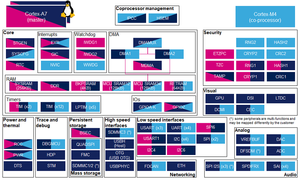1. Article purpose[edit source]
The purpose of this article is to:
- briefly introduce the NVIC and its main features
- indicate the level of security supported by this hardware block
- explain how the NVIC can be configured.
2. Peripheral overview[edit source]
The NVIC is the Arm® Cortex®-M4 interrupt controller. As a result, it cannot be accessed by the Arm Cortex-A7 core.
2.1. Features[edit source]
Refer to STM32MP15 reference manuals for the complete list of features, and to the software components, introduced below, to see which features are implemented.
2.2. Security support[edit source]
The NVIC is a non-secure peripheral.
3. Peripheral usage and associated software[edit source]
3.1. Boot time[edit source]
The NVIC can be configured through the STM32Cube.
3.2. Runtime[edit source]
3.2.1. Overview[edit source]
The NVIC can be allocated only to the Arm Cortex-M4 core to be controlled in the STM32Cube by the NVIC HAL driver.
3.2.2. Software frameworks[edit source]
| Domain | Peripheral | Software frameworks | Comment | ||
|---|---|---|---|---|---|
| Cortex-A7 secure (OP-TEE) |
Cortex-A7 non-secure (Linux) |
Cortex-M4 (STM32Cube) | |||
| Core/Interrupts | NVIC | STM32Cube NVIC driver | |||
3.2.3. Peripheral configuration[edit source]
The configuration is applied by the firmware running in the context to which the peripheral is assigned. The configuration can be done alone via the STM32CubeMX tool for all internal peripherals, and then manually completed (particularly for external peripherals), according to the information given in the corresponding software framework article.
3.2.4. Peripheral assignment[edit source]
Check boxes illustrate the possible peripheral allocations supported by STM32 MPU Embedded Software:
- ☐ means that the peripheral can be assigned (☑) to the given runtime context.
- ✓ is used for system peripherals that cannot be unchecked because they are statically connected in the device.
Refer to How to assign an internal peripheral to a runtime context for more information on how to assign peripherals manually or via STM32CubeMX.
The present chapter describes STMicroelectronics recommendations or choice of implementation. Additional possiblities might be described in STM32MP15 reference manuals.
| Domain | Peripheral | Runtime allocation | Comment | |||
|---|---|---|---|---|---|---|
| Instance | Cortex-A7 secure (OP-TEE) |
Cortex-A7 non-secure (Linux) |
Cortex-M4 (STM32Cube) | |||
| Core/Interrupts | NVIC | NVIC | ✓ | |||
4. How to go further[edit source]
Victor P. Nelson's training [1] provides detailed information on the NVIC behavior and implementation in STM32F4 microcontrollers, that can easily be transposed to the STM32MP15 Cortex-M4 based coprocessor.
5. References[edit source]
- ↑ http://www.eng.auburn.edu/~nelson/courses/elec5260_6260/slides/ARM%20STM32F407%20Interrupts.pdfARM and STM32F4xx Operating Modes & Interrupt Handling
